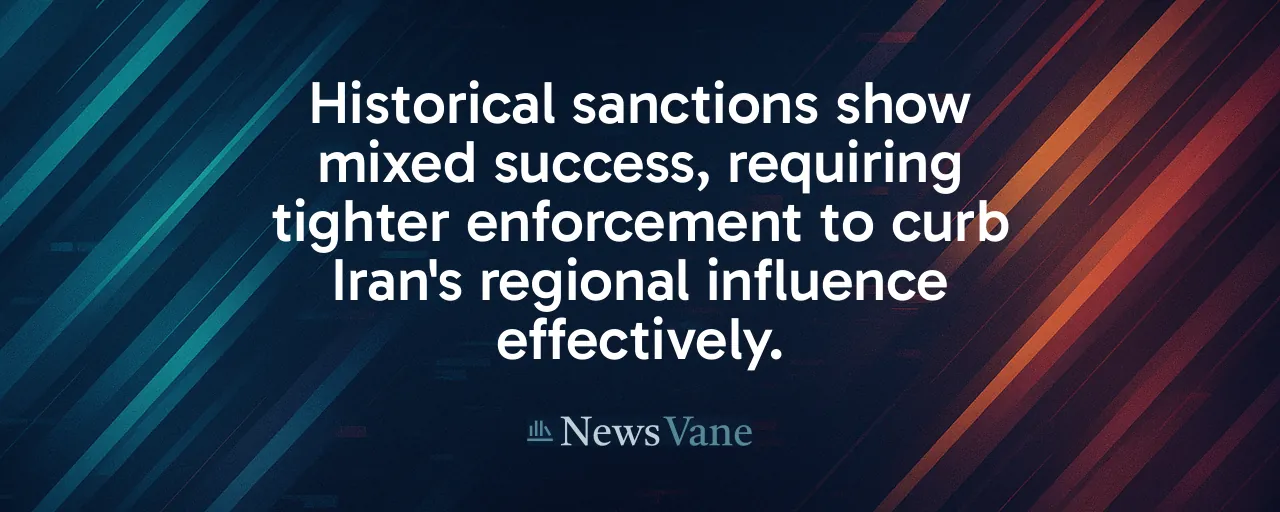A Bold Move Against Iran's Oil Network
The United States has unleashed a fresh wave of sanctions, targeting 22 entities linked to a sprawling network that funnels illicit oil revenue to Iran's Islamic Revolutionary Guard Corps-Qods Force. Announced on July 9, 2025, by the Department of State, this action zeroes in on front companies in Hong Kong, the United Arab Emirates, and Türkiye, accused of propping up Tehran's regional influence through shadowy financial channels. The move signals a renewed push to choke off funds that fuel missile programs and proxy operations, but it also stirs questions about broader consequences.
At the heart of the sanctions is a complex web of intermediaries that help Iran evade existing restrictions. These entities, often operating under the guise of legitimate businesses, move hundreds of millions of dollars through offshore accounts, enabling Iran to skirt global financial oversight. The Treasury Department's Office of Foreign Assets Control has traced specific transactions, like those involving Türkiye-based Pulcular Enerji, which used Hong Kong intermediaries to pay for oil allocated to the Qods Force. Such revelations underscore the sophistication of Iran's evasion tactics.
Why This Matters for Global Stability
The sanctions aim to disrupt Iran's ability to finance activities that destabilize the Middle East, from supporting proxy militias to advancing ballistic missile technology. The Qods Force, designated a terrorist organization under U.S. law since 2007, relies on oil revenue to sustain its operations. By targeting this financial lifeline, the U.S. hopes to limit Iran's capacity to project power, particularly in conflict zones like Syria and Yemen. The strategy, however, is not without risks, as it could ripple through global energy markets and diplomatic relations.
Historical data shows sanctions can squeeze Iran's economy. Between 2018 and 2020, maximum-pressure policies slashed Iran's oil exports from 2.5 million barrels per day to under 1 million, costing the regime over $50 billion annually. Iran has adapted by building a shadow fleet of tankers and exploiting loopholes in maritime tracking. Academic studies indicate that while sanctions cut official revenues, illicit sales through front companies offset losses, suggesting the need for tighter enforcement to achieve lasting impact.
Balancing Pressure and Humanitarian Needs
A critical challenge is ensuring sanctions hit their intended targets without harming ordinary Iranians. Research shows that past restrictions reduced Iran's GDP by up to 13 percent, driving inflation and unemployment while medicine shortages plagued civilians, despite humanitarian exemptions. The Treasury has issued General Licenses to protect medical imports, but financial restrictions often disrupt diaspora remittances and trade. Policymakers face pressure to refine sanctions to avoid collective punishment while maintaining leverage over Tehran.
Global energy markets also feel the strain. Iran's medium-sour crude is a key component of world supply, and tightened sanctions could push prices higher, especially for small Chinese refineries reliant on discounted Iranian oil. Compliance costs for banks and shipping insurers are rising, and there's a risk Iran could retaliate by disrupting Gulf oil routes. These economic stakes highlight the need for precise, multilateral strategies that pair financial pressure with robust oversight.
Lessons From the Past
Sanctions are not new to U.S.-Iran relations. Since the 1979 hostage crisis, the U.S. has layered restrictions, with a major escalation in 2012 that drove Iran to negotiate the 2015 nuclear deal. The 2018 withdrawal from that agreement and renewed maximum-pressure tactics showed both the power and limits of unilateral action. While Iran's oil exports plummeted, the Qods Force's regional activities persisted, funded partly by smuggling. This history suggests sanctions work best when paired with diplomacy and global cooperation.
Recent efforts reflect this lesson. In June 2025, the Treasury sanctioned over 30 shadow-banking actors, and the Financial Crimes Enforcement Network issued an advisory detailing 20 smuggling typologies, like ship-to-ship transfers. Experts argue that closing loopholes requires information-sharing with Asian financial hubs and stronger maritime enforcement. The current sanctions build on these steps, but their success hinges on whether allies like the UAE and Türkiye crack down on local violators.
Navigating a Complex Path
The sanctions raise practical and legal questions. Identifying beneficial owners of Hong Kong shell companies is a persistent challenge, and tracking dark tanker movements demands advanced satellite technology. Extraterritorial sanctions also spark debates over international law, with some arguing they violate World Trade Organization rules. The U.S. maintains, however, that its counterterrorism authority, rooted in Executive Order 13224, justifies broad action to protect global security.
Potential compromises could bridge divides. Phased sanctions relief tied to verifiable cuts in Qods Force funding offers one avenue. A joint task force with European and Asian partners could enhance transparency in beneficial ownership, while expanded humanitarian channels might ease civilian burdens. These ideas, grounded in expert analysis, point to a strategy that balances pressure with pragmatism, aiming to curb Iran's influence without escalating tensions.
What Lies Ahead
The latest sanctions mark a pivotal moment in U.S. efforts to counter Iran's financial networks, but their impact depends on execution and global buy-in. If enforcement tightens and allies align, Iran's ability to fund destabilizing activities could weaken, creating openings for negotiations. Missteps, though, risk economic fallout or diplomatic friction, underscoring the need for precision and coordination.
For now, the world watches as energy markets adjust and Iran responds. The sanctions' success will hinge on closing evasion routes while safeguarding humanitarian needs, a delicate balance that demands both resolve and restraint. As stakeholders from Washington to Tehran navigate this terrain, the pursuit of stability remains a shared, if elusive, goal.
This moment invites reflection on how financial tools shape global security. Targeted, transparent, and multilateral approaches offer a path to weaken illicit networks without sowing broader harm. The challenge lies in turning policy into action that delivers results for all involved.
